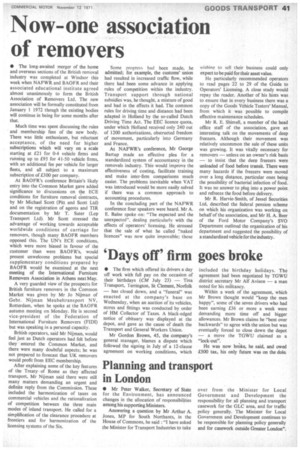Now-one association of removers
Page 43

If you've noticed an error in this article please click here to report it so we can fix it.
• The long-awaited merger of the home and overseas sections of the British removal industry was completed at Windsor this week when NAFWR and BAOFR and their associated educational institute agreed almost unanimously to form the British Association of Removers Ltd. The new association will be formally constituted from January 1 1972 though the existing bodies will continue in being for some months after that.
Much time was spent discussing the rules and membership fees of the new body. There was little enthusiasm, but reluctant acceptance, of the need far higher subscriptions which will vary on a scale starting at £21 for 0-4 vehicle firms and running up to £95 for 41-50 vehicle firms, with an additional fee per vehicle for larger fleets, and all subject to a maximum subscription of £300 per company.
At BAOFR's conference Britain's likely entry into the Common Market gave added significance to discussions on the ECE conditions for furniture removal contracts, by Mr Michael Scott (Pitt and Scott Ltd) and on the registration of agents and TIR documentation by Mr T. Suter (Lep Transport Ltd). Mr Scott stressed the advantage of working towards acceptable worldwide conditions of carriage for removers, though many BAOFR members opposed this. The UN's ECE conditions, which were more biased in favour of the customer than were BAOFR's, would present unwelcome problems but special supplementary conditions prepared by BAOFR would he examined at the next meeting of the International Furniture Removers Association in Athens next May.
A very guarded view of the prospects for British furniture removers in the Common Market was given by Mr Jo Nijman of Gebr. Nijman Meubeltransport NV, Rotterdam, when he spoke at the BAOFR autumn meeting on Monday. He is second vice-president of the Federation of International Furniture Removers (FIDI) but was speaking in a personal capacity.
British operators, said Mr Nijman, would feel just as Dutch operators had felt before they entered the Common Market, and there were many doubtful aspects; he was not prepared to forecast that UK removers would profit from EEC membership.
After explaining some of the key features of the Treaty of Rome as they affected transport, Mr Nijman said there were still many matters demanding an urgent and definite reply from the Commission. These included the harmonization of taxes on commercial vehicles and the rationalization of competition between the three main modes of inland transport. He called for a simplification of the clearance procedure at frontiers and for harmonization of the licensing systems of the Six.
Some progress had been made, he admitted; for example, the customs' union
had resulted in increased traffic flow, while there had been some advance in applying rules of competition within the industry.
Transport support through national subsidies was, he thought, a mixture of good and bad in the effects it had. The common rules for driving time and distance had been adapted in Holland by the so-called Dutch Driving Time Act. The EEC licence quota, under which Holland received only 240 out of 1200 authorizations, obstructed freedom of movement, particularly into Germany and France.
At NAFWR's conference, Mr George Bartup made an effective plea for a standardized system of accountancy in the removals industry. This would improve the effectiveness of costing, facilitate training and make inter-firm comparisons much easier. The problems inevitable when VAT was introduced would be more easily solved if there was a common approach to accounting procedures.
In the concluding part of the NAFWR conference four speakers were heard. Mr A. E. Balne spoke on: "The expected and the unexpected", dealing particularly with the effects of operators' licensing. He stressed that the sale of what he called "naked licences" was now quite impossible; those wihin to sell their business could only expect to be paid for their asset value.
He particularly recommended operators to read pages 22 to 29 of the Guide to Operators' Licensing. A close study would repay the reader. Another of his hints was to ensure that in every business there was a copy of the Goods Vehicle Testers' Manual, from which it was possible to compile effective maintenance schedules.
Mr R. E. Shimell, a member of the head office staff of the association, gave an interesting talk on the movements of deep freezers. Although their movement was relatively uncommon the sale of these units was growing. It was vitally necessary for removers — unless on an owner's risk basis — to insist that the deep freezers were unloaded of food before transit.. There were many hazards if the freezers were moved over a long distance, particular ones being the possibility of bacterial infection of food. It was no answer to plug into a power point and refreeze the food before delivery.
Mr R. Harvie-Smith, of Jessel Securities Ltd, described the federal pension scheme on which his organization was working on behalf of the association, and Mr H. A. Beer of the Ford Motor Company's SVO Department outlined the organization of his department and suggested the possibility of a standardized vehicle for the industry.










































































































































































































